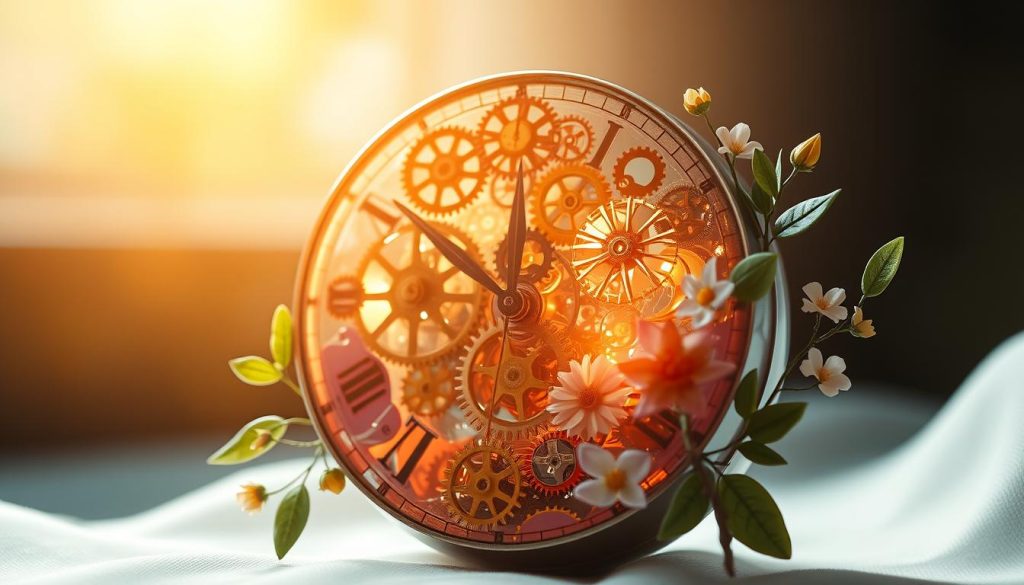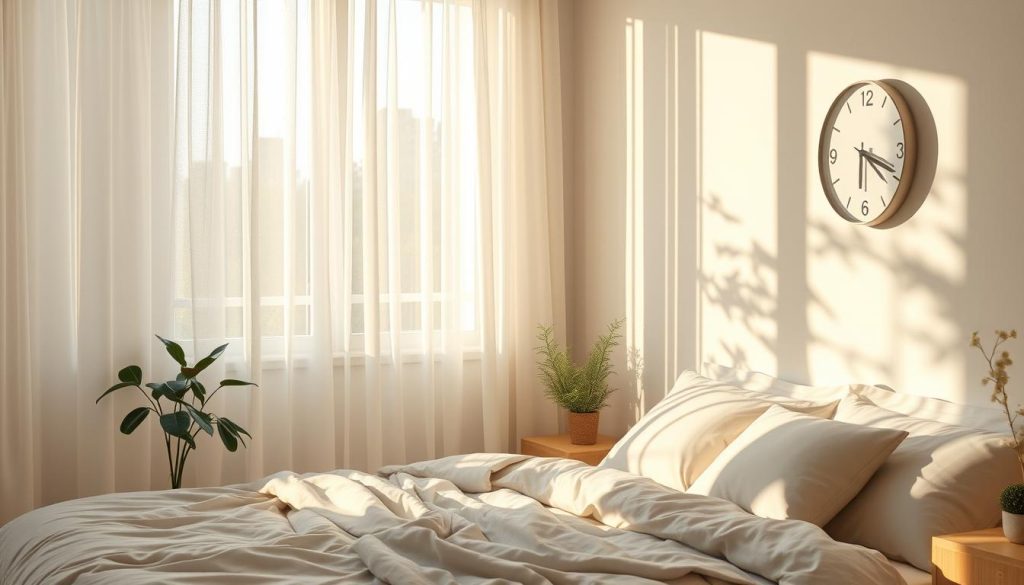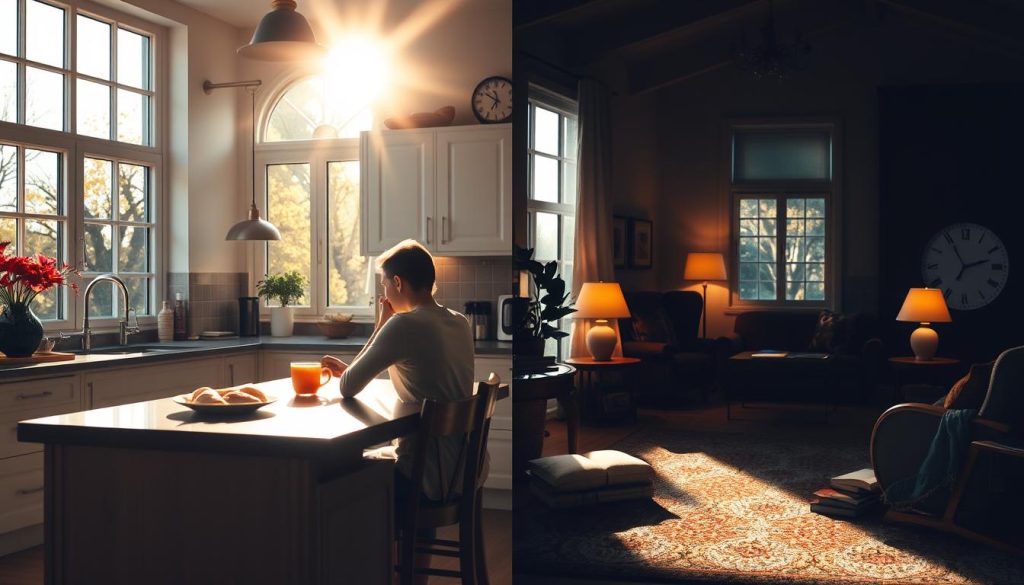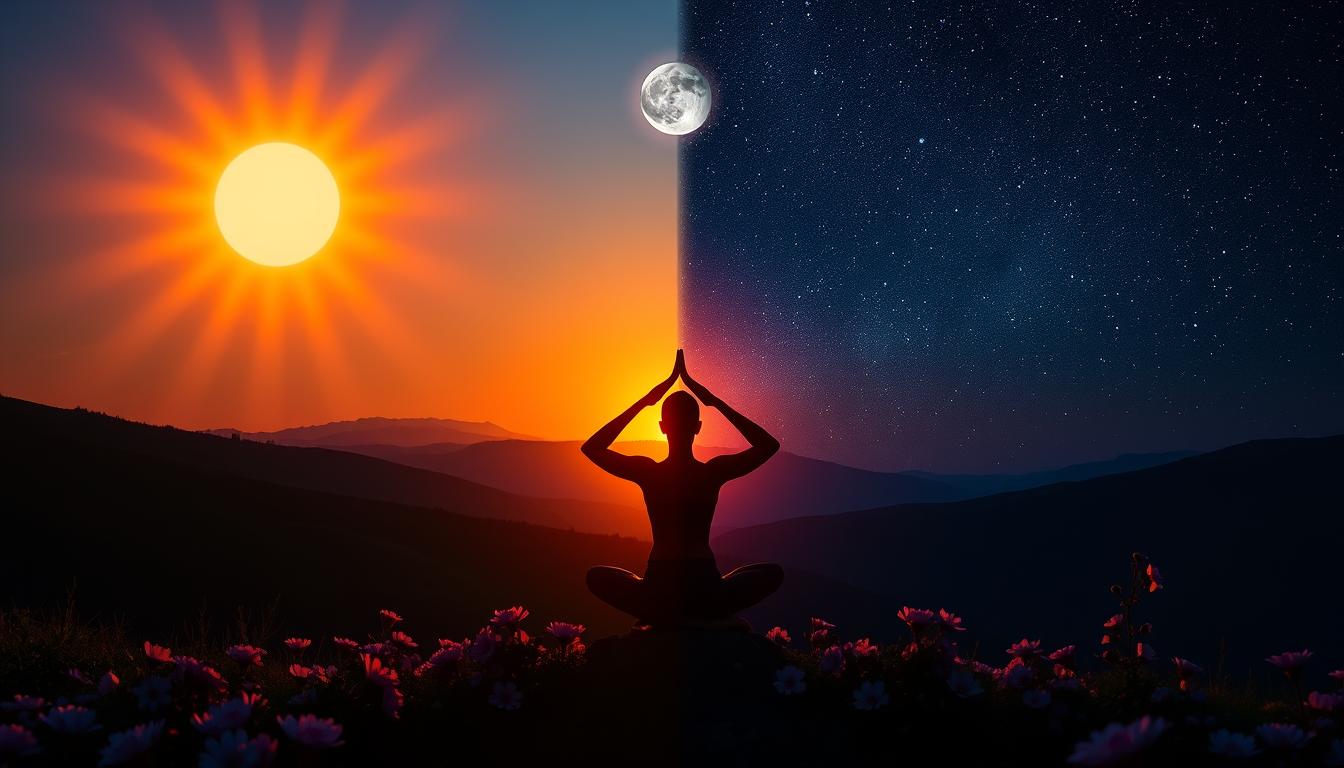Exploring the world of circadian rhythm, I’m drawn to its link with light. Our daily life and sleep cycle depend on natural light. Learning about these facts helps me value a healthy circadian rhythm more.
It also shows how crucial it is for my well-being. By getting the right amount of light, I can better my sleep and health.
Understanding Circadian Rhythm
It’s key to understand the circadian rhythm to know how our bodies work every day. This 24-hour clock controls when we sleep and wake. It’s vital for our health and well-being.
The biological clock works with light and dark to keep us healthy. This helps us stay in sync with nature’s rhythm.
What is Circadian Rhythm?
The circadian rhythm is crucial for sleep. It makes us feel awake during the day and sleepy at night. This rhythm is influenced by light and darkness.
The Role of the Biological Clock
Our biological clock is a complex system. It matches our internal clock with the outside world. When it’s off, we might struggle to sleep and face health problems.
Knowing how important our biological clock is helps us take care of our sleep and health.

The Connection Between Light Exposure and Sleep
Light exposure is key to our sleep patterns. It tells us when to be awake and when to sleep, mainly by affecting melatonin. Knowing this helps me see why managing light, especially at night, is important.
How Light Influences Sleep Patterns
Natural light sets our internal clock. When it’s light outside, I feel more alert. As night falls, less light means I start to feel sleepy. This helps my body make melatonin, helping me sleep well.
Being aware of light before bed helps my sleep match my body’s needs.
The Effect of Blue Light on Sleep Quality
Blue light from screens like phones and computers messes with this natural rhythm. It stops melatonin production, making it hard to fall asleep and affecting sleep quality. Studies show too much blue light before bed can hurt sleep.

Circadian Rhythm and Light Exposure: Key Facts
Learning about the link between circadian rhythm and light is key to better daily life. How we use light affects our mood and brain function. By matching our light use with natural daylight and avoiding artificial light at wrong times, we can lessen the effects of circadian rhythm issues.
The Impact on Daily Life
Our daily habits can change based on how our body clock syncs with the world. Paying attention to mood and energy levels helps us see this connection. For example, being indoors and using artificial light all day can make us feel worse than days spent outside.
This insight helps us make better choices about light use, especially in the morning and evening.
Why Timing Matters
When we use light matters a lot for our health. Studies show natural light in the day keeps us alert and less tired. But, using bright screens at night messes with our body clock, making it hard to sleep.
By choosing when we use different lights, we can fight circadian rhythm problems better.

| Aspect | Natural Light | Artificial Light |
|---|---|---|
| Timing of Exposure | Morning to afternoon | Evening to night |
| Impact on Mood | Improves mood and energy | May cause fatigue and irritability |
| Effect on Sleep | Enhances sleep quality | Disrupts sleep patterns |
| Health Advantages | Supports overall well-being | Can lead to circadian dysregulation |
Natural Light vs. Artificial Light
Knowing the difference between natural and artificial light is key to our well-being. I often think about how natural sunlight boosts my mood and health. On the other hand, I’m aware of the risks from too much artificial light, like from screens and bright indoor lights.
The Benefits of Natural Sunlight
Natural sunlight has many benefits. It increases serotonin, making me happier. It also helps my body make vitamin D, which is good for bones and the immune system. Plus, it helps me sleep better by keeping my body’s clock in sync.
Risks of Excessive Artificial Light
Artificial light is handy, but too much is bad. It can mess with my sleep and make me stressed. It also causes eye strain and fatigue if I don’t take breaks.
Strategies for Managing Light Exposure
Managing light is important for my daily life. Here are some strategies I use:
- Take regular outdoor breaks to soak up natural sunlight.
- Use screen filters, especially at night, to reduce blue light.
- Adjust indoor lights to be softer and warmer in the evening.
- Stick to a routine with bright light during the day and dimmer at night.
How Misalignment Affects Health
It’s important to know how being out of sync with our body’s clock affects us. When our internal clock doesn’t match the light around us, we face health problems. This can mess up our sleep and lead to serious health issues over time.
Consequences of Disrupted Circadian Rhythms
Being out of sync with our body’s clock has big effects. It’s not just feeling tired. Studies show it can cause many health problems, affecting both body and mind. Here are some key effects:
- Increased risk of sleep disorders, including insomnia and sleep apnea.
- Heightened likelihood of chronic health issues like obesity, diabetes, and heart disease.
- Impaired mental health, leading to anxiety and depression.
- Weakening of the immune system, making the body more susceptible to infections.
Knowing what causes our body’s clock to be off is key. It helps us avoid serious health problems. Being aware of our lifestyle and environment is crucial for a healthy body clock.
| Health Consequence | Description | Potential Impact |
|---|---|---|
| Sleep Disorders | Difficulty falling or staying asleep due to misaligned sleep cycles. | Fatigue, decreased productivity, irritability. |
| Chronic Health Issues | Conditions like obesity and heart disease exacerbated by poor sleep. | Increased risk of serious health events, lifestyle limitations. |
| Mental Health Impacts | Elevated anxiety and depression linked to poor sleep quality. | Reduced quality of life, potential for social withdrawal. |
| Immune Dysfunction | Weakened immune response due to irregular sleep schedules. | Higher susceptibility to illnesses and slower recovery. |
Practical Tips for Better Circadian Alignment
Improving your circadian alignment can greatly improve your sleep and overall health. I’ll share some great tips for better sleep and light exposure during the day.
Creating a Sleep-Inducing Environment
To make your sleep space better for rest, try these tips:
- Use blackout curtains to keep out unwanted light.
- Keep your room cool, between 60-67°F (15-19°C).
- Use sound machines or earplugs to reduce noise.
- Get a comfy mattress and pillows that fit your sleep style.
- Try to avoid screens before bed to help your body relax.
Best Practices for Light Exposure Throughout the Day
Light exposure is key to keeping your circadian rhythm in check. Here are some tips for light use:
- Get outside in the morning to soak up natural light.
- Avoid bright artificial lights and blue light from screens at night.
- Wear blue light-blocking glasses if you need to use screens at night.
- Use bright indoor lights during the day to mimic natural light.
- Stick to a regular wake-up and bedtime routine to help your body’s clock.
The Science Behind Circadian Rhythm
Exploring circadian science, I’m amazed by how our bodies follow a 24-hour cycle. This cycle is controlled by our body’s processes. Our brain uses light to tell us when to wake up and when to sleep.
Studies show that certain light can change how we feel and work. It can affect our mood and how our body uses energy.
Genes, like the CLOCK gene, also play a big role. They help us react to light and affect our sleep and energy. Research shows how different people’s genes can lead to sleep problems.
Knowing about circadian rhythm helps us sleep better and stay healthy. By understanding how light and genes work, we can make better choices. This knowledge helps us live healthier lives by managing our environment and habits.

